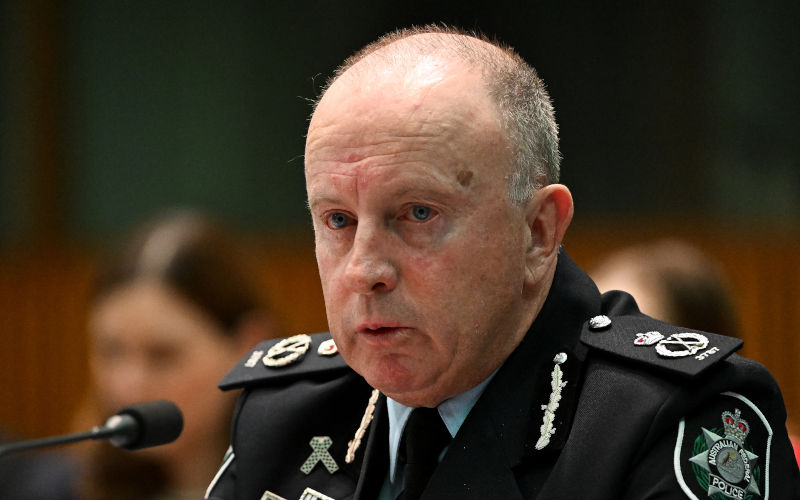Police chief hits out with compassion
April 3, 2024
ACT Chief Police Officer Neil Gaughan has expressed alarm at the severe constraints on front-line policing in Canberra while showing great sympathy for principles of drug decriminalisation and raising the age of criminal responsibility.
In a blistering final formal address as CPO, delivered to the ACT Chapter of the Australian Academy of Forensic Sciences, the 40-year veteran of the ACT force detailed his fears at the low level of general-duties patrols, now run by the most inexperienced [officers] in the country, with 40 per cent of his stations not fully functioning in a fight against an explosion of family-violence and mental-health callouts.
Add to this the winding up of one organised-crime squad and the fraud squad while having to play whack-a-mole with the Covid-19 protesters, aided by federal parliamentarians happy to promulgate fake news.
This senior Australian Federal Policemans lot is not a happy one, you might think, but Gaughan also spoke at length in terms unlike many other state and territory commissioners of my experience. He showed a great compassion for the misguided covid protesters, told how he was swayed by victims families to support the principles associated with the ACT Governments drug decriminalisation moves and gave his support also to the considerable merit of raising the age of criminal responsibility.
Problems on the front line
Gaughan was blunt about the team at his disposal: ACT Policing is seen somewhat as a training ground for the rest of the AFP. He lost almost four per cent per annum to natural attrition, topped by a whopping 12 per cent to the national side of the AFP, the result being that our general duties police officer, those most likely to provide the immediate response to crime, are the most inexperienced in the country.
At our police stations, Gungahlin, Belconnen, City, Woden and Tuggeranong, over 48 per cent of our uniform police are probationary constables.
The non-optimal outcomes of this included the dismissal of matters at court with costs against police at an all-time high. Fraud matters are now routinely investigated by detectives without specialist skills, the force is scrambling resources to deal with the growth of the Rebels, Comancheros, Finks and for the first time ever the Hells Angels. They know the Territory does not have anti-association laws, firearm prohibition orders and gang-colour bans.
Im pretty sure they are not coming for the dim sims at Dickson Gaughan said. I hope we are not caught short.
Policing matters that dont need police
We are the only mobile 24/7 response agency in the Territory, Gaughan noted. meaning that police were at nearly 4,500 mental-health incidents in 2023, many of which were aggravated because of the presence of police, instead of a mental-health professional.
Of course, police were needed where life was threatened but is the best person to attend to someone who is suffering a mental-health episode someone in a blue uniform, wearing a vest and carrying a firearm, Taser and handcuffs? NO! We should not be criminalising a health issue, and the mere presence of a blue shirt and a police car has the potential to do just that.
Almost as many (over 4,300) family-violence incidents were attended in the same time: the catchcry seems to be it doesnt happen to me so it must be happening on the other side of Canberra. Not so: these occurrences are happening in your suburb, if not your street.
Education for inter-generational and recidivist offenders was key: we need to teach young men that it is not okay to scare, monitor, humiliate or harass your partner and it is clearly not okay to strike or hit her.
Sofronoff and sex assault
Gaughan appeared frustrated that the interesting challenge that was the Sofronoff inquiry had helped keep hidden the fact that his Sexual Assault and Child Abuse Team had already been reviewed by former federal Department Secretary Renee Leon, with a recommendation for review of all sexual-assault investigations back to 1 January 2015. The reviews recommendations continue to be oversighted by a committee co-chaired by former long-serving magistrate Karen Fryar and former Victorian Police Commissioner Christine Nixon.
SACATs work was some of the most challenging in all of policing with only volunteers taken, and only after significant psych testing. Gaughan made the decision to shut down the fraud squad so as to bolster the sex-assault team.
The other area to receive more resources was unsolved homicides, with one of the organised-crime teams being shut down to help.
Gaughan believed that decision led in part to the recent arrests of two people for the 1999 murder of Irma Palasics, adding, I know that team is moving towards resolution of a number of other matters.
The lunatic fringe
The outgoing chief was exceedingly patient with the covid mob, putting in place a new command structure to deal solely with the problem.
There was no rulebook on how we policed Public Health Directions, he noted and resources could be directly hit: when we lost one member of a squad to covid, we basically lost that entire team.
Continuing education ahead of overbearing enforcement had been the mantra in the Territory whereas the way some jurisdictions enforced the health directions impacted on overall police legitimacy.
At days end, we all suffered a couple of months of very annoying protest, sadly egged on by a couple of senators being adamant that 100,000 had walked from Glebe Park to Parliament, more than 10 times the police estimate.
We see fake news continually promulgated by elected members of federal parliament that flames conspiracy theories and is a danger to public safety.

